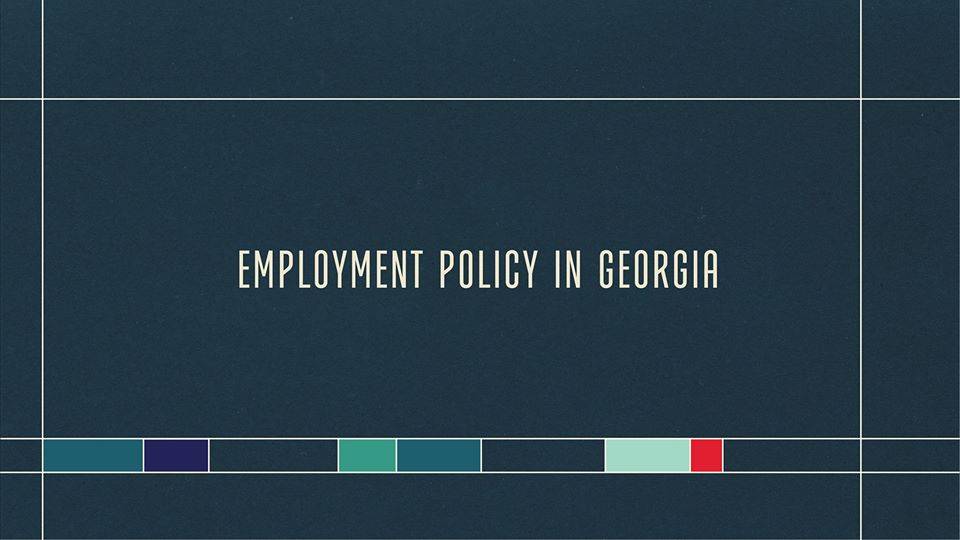
The Human Rights Education and Monitoring Center (EMC) presents three policy documents on employment policy, analyzing the framework of the existing employment policy, the labor market structure, issues related to unemployment, and social support mechanisms for the unemployed in Georgia.
In recent decades, the state's vision for tackling unemployment has largely been based on a policy of minimizing state interference in economic life, introducing low taxes, and creating favorable conditions for foreign investment. This policy, however, has failed to reduce real unemployment and provide grounds for decent labor. Although the state has intensified its employment policy in recent years, the unemployment rate remains alarmingly high, and a large proportion of jobs are unstable, low-skilled and low-paying.
Key Findings of Policy Documents:
- The services offered by the Employment Agency are often incongruous with the programs focused on private sector development, such as "Produce in Georgia", which ultimately leads to unreasonable budget spending and contributes to failure of these programs.
- The state meets labor demand mainly through providing training/retraining and consultation services; However, since the demand in the labor market is for low-skilled workers, state, ultimately, contributes to the creation of low-skilled jobs that are low-paying and unstable.
- The labor market polarization is high in Georgia, which translates to the decreasing number of average qualification jobs and the increasing number of high- and low-skilled jobs; High polarization, in turn, has a negative impact on employees and reduces the chances of their transitioning from "bad" jobs to "good" ones;
- The increasing number of low-skilled jobs has led to increased competition among workers and, consequently, resulted in lowering wages and labor standards.
- There are no common unemployment compensation systems in Georgia, such as unemployment insurance and unemployment benefits, which leaves many people without income, in case they lose their jobs, and weakens the worker’s position in the process of negotiating with their employer due to the lack of available alternatives.
- The social protection system is mainly based on the social assistance (subsistence allowance) program, which does not benefit a substantial number of persons engaged in informal and non-standard work;
Recommendations
- The state should activate the so-called "demand side policy", which means not only meeting the demand side in the labor market, but primarily creating new and high-skilled jobs;
- The national employment policy should not be produced in isolation, but should become an important component of the overarching economic development strategy;
- It is important that services offered by the Employment Agency are related to state-focused programs for the development of the private sector, such as, for example, the “Produce in Georgia” program;
- It is important that private sector and business development programs fall under a certain "industrial development" framework that focuses on the development of innovative sectors and, consequently, is oriented on creating not only "more" but also "good" jobs.
- Unemployment benefit system should be introduced in Georgia: 1) Subsistence allowance recipients should be included in the “unemployment benefit” program; 2) Unemployment benefits should be directed at individuals and not at families, as a whole; 3) In order to increase the job seeker’s motivation to find a job, there should be a gradual reduction in unemployment benefits as their income increases; 4) Procedures for participating in the social protection system should be simplified;
- In order to reduce the negative impact of labor market polarization, it is imperative for the state to have a consistent and aligned policy of developing the qualifications of the labor force. It is also important for the government to consider the idea of introducing a minimum wage that would mitigate the increased economic inequality;
The policy documents were prepared with the support of the Open Society Foundations (OSGF) as part of the project " Supporting Social Rights in Georgia through research and participatory advocacy”. Project aims to support positive and just transformation of labor, employment and homelessness policies in Georgia to improve social rights of citizens.
Policy documents can be found in the attachment
Labor_policy_in_a_development_context_1592422355.pdf
Labor_Market_Polarization_1592422377.pdf
Social_Security_for_All_Workers-merged_1593002276.pdf

